Dev Anand was named Dev Dharam Anand by his parents. But those who loved him most and whom he was closest to called him Dev. "Just 'Dev', short and sweet and possessive, godly and sexy, and intimate to the extreme, in bedrooms, in drawing rooms..."
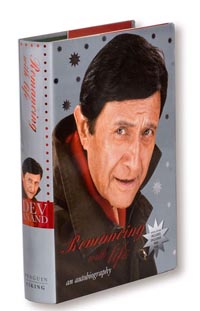 Dev Anand’s autobiography titled Romancing With Life is a candid series of reminiscences, replete with a star’s love of himself and the great adventure he embarked on six decades ago.
Dev Anand’s autobiography titled Romancing With Life is a candid series of reminiscences, replete with a star’s love of himself and the great adventure he embarked on six decades ago.
Dev Anand’s father was a prominent lawyer in Gurdaspur, now in Pakistan. When still a young boy Dev inadvertently sees a young girl exploring her body. The description is voyeuristic and sets the tone of the entire autobiography. I felt there was too much lingering over sexual beauty and sexual episodes and too little discussion about his craft and his colleagues.
It is intriguing to see how an actor decides that he wants to become an actor. Here’s how Dev Anand himself remembers this defining moment in his life:
Dev had just been accosted by this young girl on whom he had a crush. And before that another school mate had kissed him (that shows how wrong I was in thinking of our grandparents' generation as prudish!). Euphoric with his twin conquests he splashes water on his face and looks at himself in the mirror.
"Beads of water were trickling down my face, assuring me – 'Isn’t this face pleasantly presentable? Didn’t Usha confess she likes me? Didn’t Florence kiss me hard? There is something about me – I am going to present myself to the world. I want the world to see me, to admire me. I am going to be an actor. Not just an actor – I am going to be a star! I am going to steer myself towards that goal. I am going to Bombay, the Mecca of films. The glamorous world of show business awaits me. I am going to grab the limelight."
His heady euphoria is almost palpable – the reader can imagine what a 20-something dashingly handsome Dev Anand must have felt just at that very moment.
"I was dancing with excitement. I took a quick joyful twirl and punched my fist hard into the mirror. Then laughed heartily at my own reflection and saw it laughing too."
Days of Struggle
Before getting his first break he worked in the War Censorship office where he censored letters from Indian and British Army personnel posted in India on army bases and those were who were fighting the war abroad. Every morning he would "dress to kill" in his "best casuals, groom my hair properly with an accentuated puff on the right that everybody in the office seemed to admire" and jauntily walk down to the Pali Hill bus station.
First Break
Someone tells him that Prabhat Film Company is looking for a fresh face to cast in their new film. He is able to get an appointment with the top boss the very next day. And this is how he gave his sales pitch:
'What’s your name?'
'Dev Anand, sir.' I said very respectfully.
'Just Dev Anand! No surname?' He was curious.
'Anand is my surname, sir – and Dev is the first name.'
'Very short and sweet...'
'It was longer and more complicate, for Dharam was added before Dev by my parents. They named me Dharav Dev, but seeing many problem that religious faiths create in the world, I eliminated the Dharam part of it from my personality, and am happy to be just Dev now,' I said smilingly.
He laughed heartily, looking into my eyes.
'But that does not mean I am not religious. I am. But in a moderate way. Religion is in my heart, not necessarily in temples, or mosques or churches.'
'I like you attitude and philosophy. What can I do for you?'
'I am sure by now you know why I am here sir.'
'I want you to say it, go on,' he encouraged me.
'You are looking for a young lead player in your new film, and there cannot be a better choice than me...'
The next day Dev Anand is asked to meet the director PL Santoshi. The director seems to take an instant liking for him and asks him to come for audition the next day.
'Where do you live in Bombay' – asked the director.
'Pali Hill. A very peaceful and exclusive place,' I said in style.
'You speak good English. Where were you tutored?' the director wanted to know.
'In the best college this side of the Suez, sir! Lahore Government College', said Dev Anand with style.
It seems both the producer and director were suitably impressed with these credentials and that was that! He passed the audition with flying colours (the only hitch being the gap between his teeth!) and Dev Anand got his first break! Before he left the studios that day he was handed a three-year contract at four hundred rupees a month. The move was Hum Ek Hain in 1946, directed by PL Santoshi, with Durga Khote, Kamla Kotnis, Rehana and Rehman.
Dev Anand never doubted his destiny. He says though he had no formal training in acting, he always knew he had that indescribable quality in him...the "mirror always told me with a chorus of angelic voices, 'Wow, let the world see you!'"
Taxi Driver
A friend suggested a film on a taxi driver, saying such a character was bound to go down well with the masses. Goldie or Vijay Anand, his brother, who was then studying in St. Xavier college, was asked to prepare the script and Chetan Anand, whose earlier directorial ventures had bombed at the box office, was persuaded to take on the film as his next project. The film, a Navketan production, was shot on a shoe-string budget. "Survival of the company was the motivating factor, and lack of funds drove us to work at breakneck speed."
The movie was Navketan’s first superhit and the film in which Dev Anand tied the knot with Kalpana Kartik. After his innumerable flirtatious rendezvous which are described in such provocative detail, his run-away married with his sweetheart comes across as a somewhat dull interlude (which is perhaps what it was...)
Guide
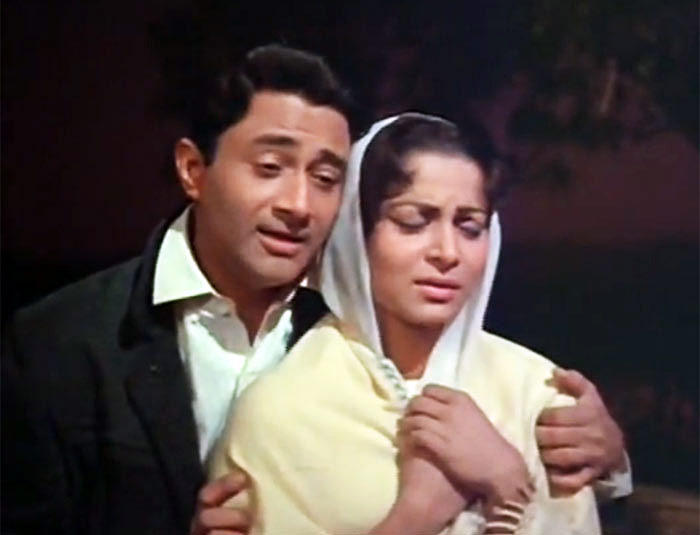 Perhaps Dev Anand’s most remarkable film, the autobiography thankfully sheds light on the making of the film. The actor was in Berlin attending the Berlin Film Festival (Hum Dono was India’s official entry at the 1962 Berlin Film Festival) when he was told about the book "The Guide". He finished reading it in London, in his hotel room balcony that overlooked the Hyde Park and then flew down to New York to discuss the book with Pearl S Buck (interesting bit of trivia here about how Buck had to formally send an invitation to Anand to allow him to travel to the US. Government regulations did not permit overseas travel without an invitation from someone abroad).
Perhaps Dev Anand’s most remarkable film, the autobiography thankfully sheds light on the making of the film. The actor was in Berlin attending the Berlin Film Festival (Hum Dono was India’s official entry at the 1962 Berlin Film Festival) when he was told about the book "The Guide". He finished reading it in London, in his hotel room balcony that overlooked the Hyde Park and then flew down to New York to discuss the book with Pearl S Buck (interesting bit of trivia here about how Buck had to formally send an invitation to Anand to allow him to travel to the US. Government regulations did not permit overseas travel without an invitation from someone abroad).
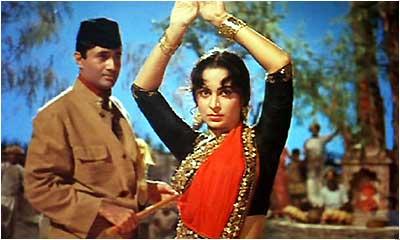 The English and Hindi versions were shot separately. Earlier they were being shot simultaneously to save on costs. But that created a lot of tension between Chetan Anand who was directing the Hindi version and Tad Danielewski who was directing the English movie.
The English and Hindi versions were shot separately. Earlier they were being shot simultaneously to save on costs. But that created a lot of tension between Chetan Anand who was directing the Hindi version and Tad Danielewski who was directing the English movie.
While the English movie was being shot, Goldie replaced Chetan and the Hindi Guide went on to become one of Goldie’s greatest movies. Dev Anand who was producing the movie rightly decided that since the sensibilities of the audiences for the two movies were diametrically opposite, the treatment and event the script had to be different. So the screenplay for the English film was written from scratch. This of course skyrocketed the budget of the movie to astronomical levels.
There is a nice little anecdote of how once the English shooting of the film was over writer Pearl S Buck hugged Waheeda Rehman and kissed her, pleased that she had delivered her lines in English with the proper accent!
When the shooting of the climax scene was taking place at the dry river bed of the river Baramati in Gujrat, thousands of people started congregating at the site to see the shooting. Most of them thought he was actually a sadhu doing his tapasya. "Men and women, tramping barefoot on burning parched earth, travelling on bicycles and motorbikes, covering miles and miles on bullock carts, whipping their animals to go faster, packing into overcrowded buses, hanging outside or clutching on to their rooftops, truck loads of humanity from neighbouring villages and towns, converged and gathered on the spot where their ‘Mahatma’ was fasting, to sit at his feet and touch them..."
And then the narcissistic streak in Dev Anand takes over.
"I had transcended all human emotions, making the 'self' in me the sole conqueror. The ascetic in me was totally in tune with my performance during those glorious days of my own discovery."
Guide left the audience bewildered. As Dev Anand explains it, they could not accept their matinee idol, the carefree lover boy Dev Anand as a saint and a martyr. And how could he love another man’s wife – that too was a completely shocking new theme for the audiences. While the movie opened with great fanfare, with the entire Indian cabinet coming for the premier, reports of audience reactions were not very encouraging. As the actor puts it, "usually after a premier, there is a plethora of telephone calls, congratulating or criticizing the producer. But this time, calls there were none. It was as if all our telephones were dead, and the wire had been pulled out." Never one to feel despondent over box office failure, Dev Anand gives an optimistic spin to his Guide venture. "Though not much money in terms of hard cash flowed in, the film kept sending gold to the coffers of our jubilant minds, in terms of recognition of our artistic achievement. As time passed, people found more and more meaning in it, and enjoyed seeing it again and again."
Guide was India’s official entry for the Oscars in the foreign language category (it was shortened considerably and most of its songs were deleted).
Hare Ram Hare Krishna
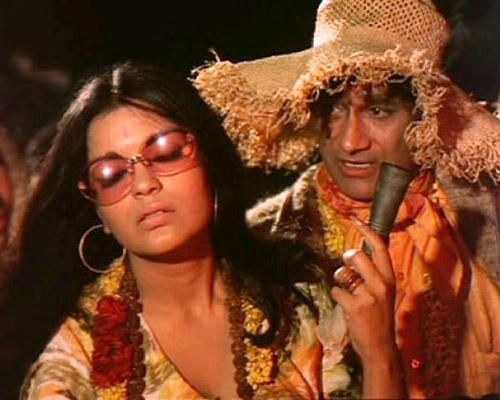 It was while he was visiting The Bakery, a famous hippie joint in Kathmandu, that the idea for Hare Rama Hare Krishna came to Dev Anand. His narration of his visit to the bakery has a strange sense of déjà vu for the reader – for what he saw there is what he replicates so memorably in the movie.
It was while he was visiting The Bakery, a famous hippie joint in Kathmandu, that the idea for Hare Rama Hare Krishna came to Dev Anand. His narration of his visit to the bakery has a strange sense of déjà vu for the reader – for what he saw there is what he replicates so memorably in the movie.
The place was filled with young hippies in various stages of drug induced intoxication and undress, lying in each other’s arms, kissing, engaging in foreplay and more. And midst all of them is a lovely young girl, who misplaces her glasses.
"Bob, mera chashma," she asks her companion.
This is Janice or Jasbir. Her parents were divorced. She was from Montreal. She had run away from home because of the constant fights and disharmony at home.
Dev Anand was so excited with the new story idea that was forming in his mind that he immediately met the king of Nepal to seek his permission to shoot his next film in Nepal.
The King readily granted his permission and suggested he put up at his brother’s hotel, The Fish Tail, situated picturesquely against the towering Annapurna mountains, to write his script. And that is where Hare Rama Hare Krishna was born.
When Dev Anand returned to Bombay and announced his next project everyone thought he was talking of a mythological movie! At that time he was already working with Mumtaz for Tere Mere Sapne. "We made a good-looking pair. She was friendly, very amiable, an easy-going, uninhibited co-star." She showed her keenness to be in Hare Ram...however, after hearing the basic plot, she realized she couldn’t really be Dev’s sister!
"Am I in your picture?" she asked.
"'You need to change your style to get into the shoes of Janice in my film Mumsy, " I said. That’s what I called Mumtaz.'
"My feet can get adjusted to all types of shoes, and of all sizes!" she said. "I must do you film – tell me the part."
I gave her a brief narration of the story.
"It’s a hell of a role for any girl who does it," she said, "but I don’t think I want to play your sister."
"Why not?" I asked her.
"For I don’t feel like one, when you are with me," she explained.
We both laughed.
"Would you agree to do the smaller and less significant part?" I asked.
"Only if it is the romantic one," she replied.
"In that case, let me have the privilege of asking you, 'Will you be the romantic leading lady opposite me, Mumsy, in my film Hare Rama Hare Krishna?' I said in great style.
"Privilege granted!"
And so the hunt started for the leading lady of Hare Rama Hare Krishna. He met Zeenat Aman, freshly crowned Miss Asia at a party. Their first meeting has already been discussed in countless interviews before. And yet, hearing it from Dev Anand himself, is riveting. The kind of stuff that makes for Bollywood legends.
"As she sat in front of me, she was a picture of self-confidence, radiating a devil-may-care attitude. She was wearing a broad belt round her waist over a pack of slacks, a small purse hanging from it in front. I was wondering what was inside it, when her hand went there. She took out a pack of expensive cigarettes. Her other hand went into her handbag to take out a gold lighter. She had a style of her own, not bothering who was looking at her. She took out a cigarette and put it between her lips. That was the moment her eyes met mine, for I was constantly watching her and her bearing. She smiled an attractive girlish smile, and stretched her hand towards me, offering me a cigarette as well. Before I could pull out a cigarette from the pack, she had already taken one out for me. I put it straight into my mouth, still looking at her. She now ignited the lighter with a single flick, and put its flame on my cigarette, looking straight into my eyes. The flame of the lighter lit up her smiling eyes...
"I am your Janice, Dev."
Dev went on to make several more movies with Zeenat. They had a fall out when he discovered she was moving over to the RK Banner camp and was pitching for the lead role for Satyam Shivam Sundaram. Quite ironically he had been planning to propose to her after a party when he found Raj Kapoor flirting with her and asking her why she had worn anything other than a white sari. "You are breaking your promise," he heard Raj Kapoor say to Zeenat. "...that you will always be seen by me only in a white sari." That broke Dev Anand’s heart.
During the shooting of Hare Rama Hare Krishna in Nepal, one day after pack up, after Dev Anand had returned to the hotel he realized he had misplaced the complete script of the movie. He then remembered he had left it on top of a mountain, where they had been shooting earlier. The only helicopter available then, since it was already night, was the king’s. The king graciously sent over the royal helicopter, and quite miraculously the complete script was found lying on the ground, entwined in twigs.
Goldie introduced
When still in Gurdaspur, Dev Anand, then in his teens had picked up a fight with another boy over his marble collection, then his most precious possession. The other boy hit him hard and he fell down on the gravel. As he got up to punch him back, Goldie, eight years his junior clung to his legs, begging him not to fight. Goldie was terrified that something would happen to his dear elder brother and broke into tears, entreating him not to go after the other boy.
"He looked at me, tears rolling down his cheeks...His eyes shone, his long golden hair, with the evening sun directly falling upon them, looked absolutely mesmerizing with a particular ray enhancing the yellow gold of its colour. He seemed like an angel who had appeared straight out of a fairy tale."
Dev Anand’s father had named Vijay Anand Goldilocks because of his golden long curls!
Chetan Anand
His elder brother Chetan, was Dev Anand’s role model: "He was a model of everything I admired, handsome, intellectual, fashionable." Chetan Anand had taught in Doon School before plunging into the world of films. A tennis player, an excellent swimmer, and a graduate of Lahore Government College, he had gone to England to apply for the Indian Civil Service Exams.
The autobiography has an amusing account of how impeccably 'propah' Chetan’s English upbringing was. He taught Dev Anand that when someone asked "How do you do?" you had to reply with a "How do you do?" and not, as most of us are wont to do – with an account of how we were!
Chetan Anand taught Dev Anand the nuances of acting – which helped him start of his career "though later, as I became a star, and then a superstar, I outgrew it, and went far ahead of everybody else around me, to evolve a style that was hailed as unique and as entirely my own."
The brothers then went on to make movies for their own banner, Navketan, Taxi Driver being one of their biggest hits together. However Chetan Anand’s creative sensibilities were not in tandem with that of his younger brother. And the bitter fallout happened when one day Dev Anand came across a letter written by Chetan Anand to his wife. "There is a lot I would like to do in this company, but Dev is my problem", wrote Chetan. Thereafter Dev Anand gradually started to prepare Goldie to take on the director’s mantle from Chetan. With Nau Do Gyarah,Navketan entered a new phase with Goldie or Vijay Anand coming into his own as one of Navketan’s most brilliant directors and the Dev Anand – Vijay Anand duo forming one of the most creative in-house teams in Hindi film history.
Chetan Anand’s first movie Neecha Nagar won the Golden Palm in the very first year of the Cannes Film Festival.
Marriage
Dev Anand never really seems very passionate about his lady love Mona Singh (Kalpana Kartik). From his reminiscences, it appears it was she who was very keen for a commitment. "Make me a commitment – and I am yours, not only for now, but for all times." She meant professionally, that she would not work for banners outside Navketan, but it was quite obviously meant to prod the footloose and fancy free Dev Anand to hang up his philandering boots! The poor man dithered, throwing pebbles into the sea, but Mona was adamant.
"How long will you take to decide?"
She refused to let me return until he had given his answer.
"What if I don’t decide now", he asked .
A flood of tears sealed the issue. They decided to get married without any official announcement. "No fuss in our marriage...No music except that of the dancing in our hearts..." said Dev. And exactly after a fortnight, while on the sets of Taxi Driver they walked across to the Registrar of Marriages and came back for the shooting as husband and wife.
Not quite the heady elopement one had always imagined it to be! Amusingly enough the cameraman spotted Mona with a ring and pointed out that the ring hadn’t been there in the previous shot. Mona completely disappears from his narrative, never once making her presence felt even when he fell head over heels in love with Zeenat Aman. She only reappears towards the end, when Dev Anand says that she preferred to seclude herself with her Jewish friends and her beautician friend and would keep herself busy with religious rituals.
Guru Dutt
How Dev Anand met Guru Dutt for the very first time makes for a great anecdote! Dev Anand and Guru Dutt shared the same dhobi, without them knowing it, of course. One day as he put on his shirt, he realized the shirt wasn’t his. When he entered the studios he met a young man who introduced himself as Guru Dutt, who was then working as an assistant director. As they were about to go on to their respective studios, both of them realized they were wearing each other’s shirts! "We both laughed like we had never laughed before. We hugged each other, wearing each other’s shirts, and became the greatest of pals, for all times."
Guru Dutt and he shared the same wavelength. They would watch film classics together, cycle through the streets of Pune (where they were both shooting) looking for books and magazines that excited them.
When Dev Anand’s first movie Hum Ek Hain was to be released, he was travelling with Guru Dutt on the local train and he spotted posters of his movie with his face on it, on the platforms. Guru Dutt understood how Dev Anand must be feeling and went up to a few girls who were looking at the poster to ask them what they thought of the new hero on the poster. They all said he was truly a handsome man! That made Dev Anand’s day!
One day, on the sets of Teen Deviyan, he got the news that Guru Dutt was no more. He drove right away to Guru Dutt’s house. He was the only visitor then. Guru Dutt face, says Dev Anand, had turned blue. There was a blue liquid in a glass lying next to him on his bedside table.
"My heart tore into shred. I silently walked back to my car. As I drove away, I saw the two of us together on the Poona hilltop where we had first dreamt our dreams by the fading light of the setting sun.
As Raj Kapoor, with a sad smile, stroked Guru Dutt’s face, his body wrapped in white, waiting to be lit on the funeral pyre, I bade my last farewell to the greatest friend I have ever had in the movie industry."
Ashok Kumar
When Dev Anand first arrived in Mumbai it had been his dream to meet Ashok Kumar one day. In fact he remembers seeing Ashok Kumar’s posters on the railway platforms and hoping that maybe one day his posters would be displayed alongside the great man’s! One day Dev Anand was summoned by Ashok Kumar to the studies where he offered Dev Anand a film with Bombay Talkies and asked him how much he would like as remuneration. Dev Anand replied "Just make a good actor out of me. That is the price I want to charge for the film". The film was Ziddi, which catapulted Dev Anand into the big league.
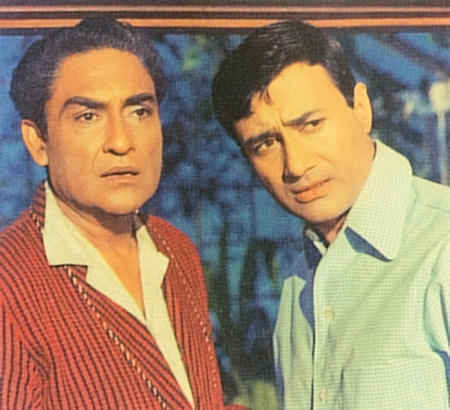 Years later, Dev Anand returned the favour by casting Ashok Kumar in an interesting negative role in Jewel Thief. It seems Dadamoni was quite reluctant to play the villain and it took a lot of persuasion on Goldie’s part to finally convince him.
Years later, Dev Anand returned the favour by casting Ashok Kumar in an interesting negative role in Jewel Thief. It seems Dadamoni was quite reluctant to play the villain and it took a lot of persuasion on Goldie’s part to finally convince him.
As he was leaving the studio he met Nasir Khan, who had been hoping to bag the lead man’s role for Ziddi. They got talking and it turned out both of them lived in Pali Hill. Nasir Khan’s father was a fruit merchant at Crawford market and was from Peshawar. Every other evening the two of them would sit by the sea side and gaze at the sunset, wondering what the future held in store for them. One day, as they were returning home together, they met Nasir’s elder brother.
"One day, outside his home, he introduced me to his elder brother, who stood there looking very striking in a white shirt and white pants. He was doing his first film for Bombay Talkies at the time. His name was Yusuf Khan. The world knows him better as Dilip Kumar, the biggest and the most charismatic star of the Indian screen."
(Coming as it does from Dev Anand, that is indeed very generous praise)
Dev Anand meets Gregory Peck
Dev Anand had first met Gregory Peck in Willingdon Club, in Bombay, at a party hosted by JC Jain, of the Times of India. Some years later when he was travelling in Rome, he found Peck shooting for a movie in the city. Being a fan, Dev Anand was eager to meet Peck. Their encounter comes across a starry-eyed fan’s brush with a Hollywood celebrity. The star writes quite candidly -
"He casually looked at me. I waved. He nodded in the same casual way as he would at any other in the crowd and looked away. I got hold of the girl with a copy of the script in her hand...and said to her in an undertone, 'I know Mr. Peck. Can I have a word with him?' 'I am afraid not here – he cannot be disturbed,' was her curt reply."
Eventually he does get to meet Peck.
"The Willingdon Club meeting was remembered, the present meeting welcomed and a future one, whenever, looked forward to by both of us. All this happened in precisely a couple of minutes."
Also on the shoot was the "extraordinarily beautiful Audrey Hepburn".
Meeting Pandit ji
Dev Anand comes across as slightly miffed by Pandit ji’s nonchalant attitude towards him, the reigning star of movies! He had carried a special red rose to gift to the Prime Minister. Panditji bestowed "just a casual half-smile on me, the other half preoccupied, with a certain superior air, he looked away toward the idolizing screams of 'Panditji ki jai', to which he seemed addicted."
It’s funny how Dev Anand disapproves of Nehru’s vanity, considering the entire book is an extended fan mail to himself! When Nehru smiles with a "touch of "I –am-bigger-than-you" smile or when he basks in the adoration of those clamouring to meet him, it is met with a disapproving sniff from the star!
Another encounter between our first Prime Minister and the ruling trio at the box office is particularly enlightening! It seems all that the stars asked the Prime Minister was about his romantic trysts!
Here’s an extract:
Raj asked him, 'We hear you used to be very popular and amorously attracted to ladies wherever you went, Panditji!'
'Not as popular as you fellows are!' was his quick retort with his very famous smile.
I had read that he owned the most charming smile and was hailed as the owner of the most photogenic face (Comment: Do we sense some envy here?) So I asked, 'Your devastating smile stole the heart of Lady Mountbatten – is it true, sir?'
He blushed, enjoying my question and laughing it away saying, 'I love all those stories about me!'
'But they all say she herself confessed her weakness for you!' Dilip joined in, in a very humorous strain.
Hollywood Calling
We all know Guide was India’s first international collaboration, with a premier in New York. While in New York Dev Anand was approached to collaborate with David Selznick (of the Gone With The Wind fame) on a film to be shot in Kashmir. Dev Anand recalls in a wistful tone "Clark Gable in Gone With The Wind and now Dev Anand, from India, both in David Selznick’s films..." Alas, it was not to be. Unfortunately Selznick suddenly died of a massive heart attack and the project died with him.
Afterwards Dev Anand thought of launching an international film based on the novel The Princess by Manohar Malgonkar. He even met Sir Alec Guinness, for the role of the Maharaja in the movie. But the project got shelved – due to reasons not divulged!
Continued to The Irrepresible Dev
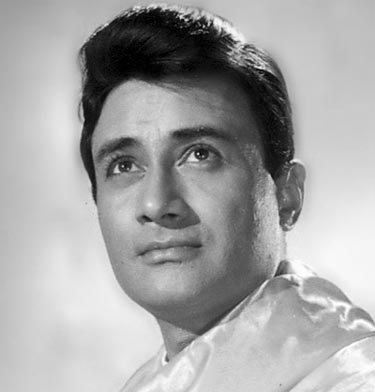
 Dev Anand’s autobiography titled Romancing With Life is a candid series of reminiscences, replete with a star’s love of himself and the great adventure he embarked on six decades ago.
Dev Anand’s autobiography titled Romancing With Life is a candid series of reminiscences, replete with a star’s love of himself and the great adventure he embarked on six decades ago.  Perhaps Dev Anand’s most remarkable film, the autobiography thankfully sheds light on the making of the film. The actor was in Berlin attending the Berlin Film Festival (Hum Dono was India’s official entry at the 1962 Berlin Film Festival) when he was told about the book "The Guide". He finished reading it in London, in his hotel room balcony that overlooked the Hyde Park and then flew down to New York to discuss the book with Pearl S Buck (interesting bit of trivia here about how Buck had to formally send an invitation to Anand to allow him to travel to the US. Government regulations did not permit overseas travel without an invitation from someone abroad).
Perhaps Dev Anand’s most remarkable film, the autobiography thankfully sheds light on the making of the film. The actor was in Berlin attending the Berlin Film Festival (Hum Dono was India’s official entry at the 1962 Berlin Film Festival) when he was told about the book "The Guide". He finished reading it in London, in his hotel room balcony that overlooked the Hyde Park and then flew down to New York to discuss the book with Pearl S Buck (interesting bit of trivia here about how Buck had to formally send an invitation to Anand to allow him to travel to the US. Government regulations did not permit overseas travel without an invitation from someone abroad).  The English and Hindi versions were shot separately. Earlier they were being shot simultaneously to save on costs. But that created a lot of tension between Chetan Anand who was directing the Hindi version and Tad Danielewski who was directing the English movie.
The English and Hindi versions were shot separately. Earlier they were being shot simultaneously to save on costs. But that created a lot of tension between Chetan Anand who was directing the Hindi version and Tad Danielewski who was directing the English movie.  It was while he was visiting The Bakery, a famous hippie joint in Kathmandu, that the idea for Hare Rama Hare Krishna came to Dev Anand. His narration of his visit to the bakery has a strange sense of déjà vu for the reader – for what he saw there is what he replicates so memorably in the movie.
It was while he was visiting The Bakery, a famous hippie joint in Kathmandu, that the idea for Hare Rama Hare Krishna came to Dev Anand. His narration of his visit to the bakery has a strange sense of déjà vu for the reader – for what he saw there is what he replicates so memorably in the movie. Years later, Dev Anand returned the favour by casting Ashok Kumar in an interesting negative role in Jewel Thief. It seems Dadamoni was quite reluctant to play the villain and it took a lot of persuasion on Goldie’s part to finally convince him.
Years later, Dev Anand returned the favour by casting Ashok Kumar in an interesting negative role in Jewel Thief. It seems Dadamoni was quite reluctant to play the villain and it took a lot of persuasion on Goldie’s part to finally convince him. 


